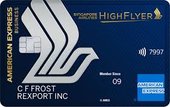Who are credit cards for overseas spending suitable for?
- Travel enthusiasts. Would you rather be anywhere but Singapore? If you travel extensively, either for business or pleasure, not having to pay a fee every time you use the card overseas can save a surprising amount of money. Additionally, there's the added benefit of overseas spend typically earning rewards at the higher rate.
- Online shoppers. Anyone frequently shopping online on foreign websites can save with every purchase.
- Businesses. Save when paying overseas suppliers, service providers, and freelancers. Many business credit cards do not charge fees on foreign transactions.
Features to compare for overseas spending credit cards
- Foreign transaction fees. Sometimes called a currency transaction fee or foreign currency fee. Typically charged on any transaction made overseas, from an overseas business, or in a foreign currency. Lower or no foreign transaction fees are better.
- Rewards and cashback earn rates on foreign spend. Some cards reward overseas spend with an earn rate higher than the base rate.
- Additional benefits. Besides not charging for forieng currency transactions, look for other useful features such as its welcome bonus offer, airport lounge access, free travel insurance, or concierge service.
How to compare overseas spending credit cards
- Check the foreign transaction fee. Preferably there is no fee on overseas transactions, but if there is, how much is it? Lower is better.
- Compare rewards. Choose if you want to earn credit card rewards points or get cashback. Once you have decided, check what the earn rate would be on overseas spend (since it's often different from what you get on SGD transactions made in Singapore).
- Sign up bonus comparison. Getting a new credit card can be highly rewarding, so consider your options in terms of welcome bonus. Check what you need to do to trigger it, since this varies between cards.
- Annual fees comparison. While many banks waive the annual fee for the first year or two, not all do. Assuming you keep the card and eventually incur the annual fee, is the card's features and benefits worth it?
- Filter out offers based on what you need. For example, will you value credit card travel insurance or lounge access passes?
Pros and cons
Pros
- Save money on foreign transaction fees.
- Spend overseas, earn air miles, rewards points, or cashback quickly.
- Large welcome bonuses on offer.
Cons
- Some cards charge an annual fee.
- Spend required to get the welcome bonus.



